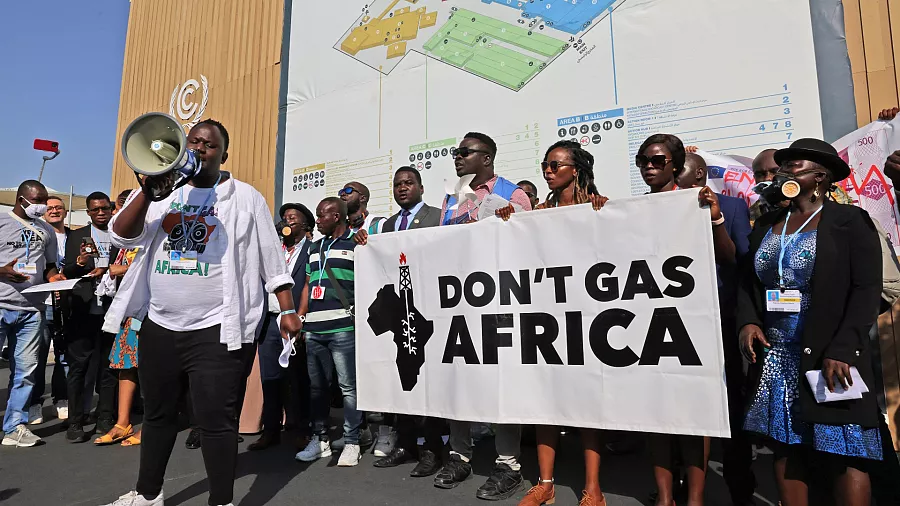As the 28th edition of Conference of the Parties (COP28) in Dubai, United Arab Emirates (UAE) gradually draws to a close, climate activists from Nigeria have expressed concern that marginalised communities in Africa bear a disparate burden of environmental pollution, hazardous wastes and other negative impacts of extractive and other destructive activities.
To address the underlying systemic issues perpetuating the expansion of sacrifice zones on the continent, it is essential to bring about regulatory changes, community involvement, grassroots advocacy and people-centred practices toward a just and equitable society.
They maintained that halting the expansion of sacrifice zones is a key demand of the Eco-social Energy Transition Manifesto of the People of the Global South.
At one of the joint side events at COP28, Oilwatch Africa and Health of Mother Earth Foundation (HOMEF) examined pathways that could be explored to bring about the needed changes to reject false climate solutions and ensure an inclusive. Key aspects of the manifesto that were highlighted included the call for payment of ecological debt owed the Global South, elimination of energy poverty and a rejection of land grabbing or green colonialism.
Executive Director of Kebetkache Women Development Centre, Emem Okon, highlighted the challenges and issues women face due to extractive activities, saying: “Grassroots women in the Niger Delta are very vulnerable to environmental degradation.
“Women contribute immensely to the local economy with a heavy reliance on environmental resources. This exposes them to the disruptive impacts of land grabs, gas flaring, and oil spillages.”
She also noted that women are excluded from decision-making processes thus complicating their dilemma. She stressed that as women face violence due to fossil fuel extraction and climate change, there is a need to integrate their roles, concerns and interests in decision-making.
Project Officer, Youth Desk, Ukpono Bassey, who canvassed youth involvement in the fight against environmental degradation, said: “This the time for youth to be involved in leadership. After 28 COPs, it is evident that the elders have fallen short. The baton must be passed to the youth who are ready and compelled to take charge. The time for change is now a change that ensures a sustainable future for generations to come.”
Read Also: Plastic pollution from cigarette butts to cost $186b in 10 years, says report
In her contribution, Odudabasi Asuquo, Project Officer, Oilwatch Africa agreed that it was unacceptable that instead of phasing out fossil fuels, there has been a mad rush of investments in Africa, assaulting sensitive ecosystems and vulnerable communities and risks saddling them with toxic stranded assets. She cited examples of communities in Uganda, Senegal, Namibia, and Botswana that need global solidity to ensure ecological justice.
Also, Coordinator of Fishnet Alliance, Stephen Oduware highlighted the various challenges faced by fisher folks through diverse false climate solutions including the use of water bodies as carbon sinks or for risky experimentation.
His words: “Coastal communities across Africa are gradually disappearing due to coastal erosion. They are gravely impacted by the impacts from the mindless exploration and exploitation of crude oil and gas. The communities are predominantly fishing and farming communities whose livelihoods, including their rights to a pollution-free environment, have been taken away by powerful corporations, with the complicity of governments.
“The COP has become a yearly ritual, and COP28 is no different. The space has largely become a space for making business deals – with no real action for the people. We need to unite to overthrow this current system of oppression, suppression and inaction until victory is achieved.”
On his part, Coordinator of Oilwatch International, Kentebe Ebiaridor lamented the fact that representatives of countries at COP28 continue negotiating with no clear decision to phase out fossil fuel rapidly, firmly and fairly.
He also bemoaned the undue influence of the fossil fuels lobbyists at the COP, noting that giving new permits for crude oil and gas violates any hope of meeting the Paris Agreement target of 1.5°C above preindustrial levels.
The side event closed with a resolution that the world could no longer afford more sacrificial zones that present nothing but an unlivable future.
“Extractive crimes must cease immediately, and governments must enforce and strengthen regulations to ensure proper accountability and responsibility.
“Transitioning to cleaner energy must ensure that frontline communities are fully integrated in decision-making and have the right to reject destructive extractive activities just as the people
of Ecuador did in August 2023 when they voted to stop extraction of crude oil in Yasuni,” the groups stressed.






